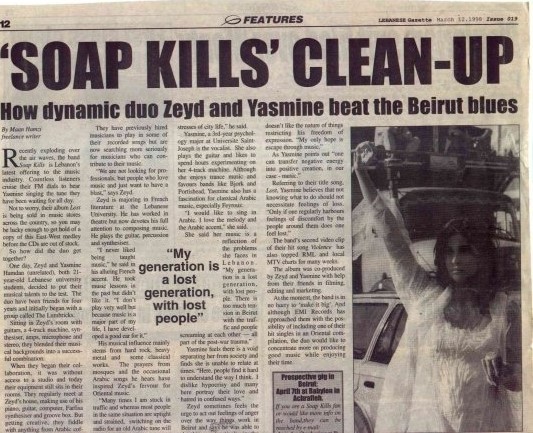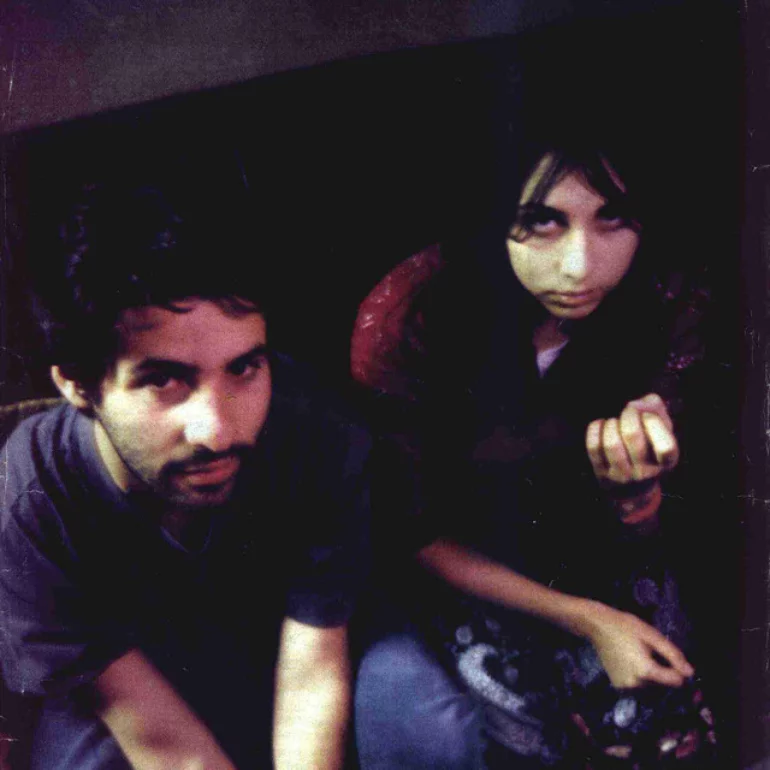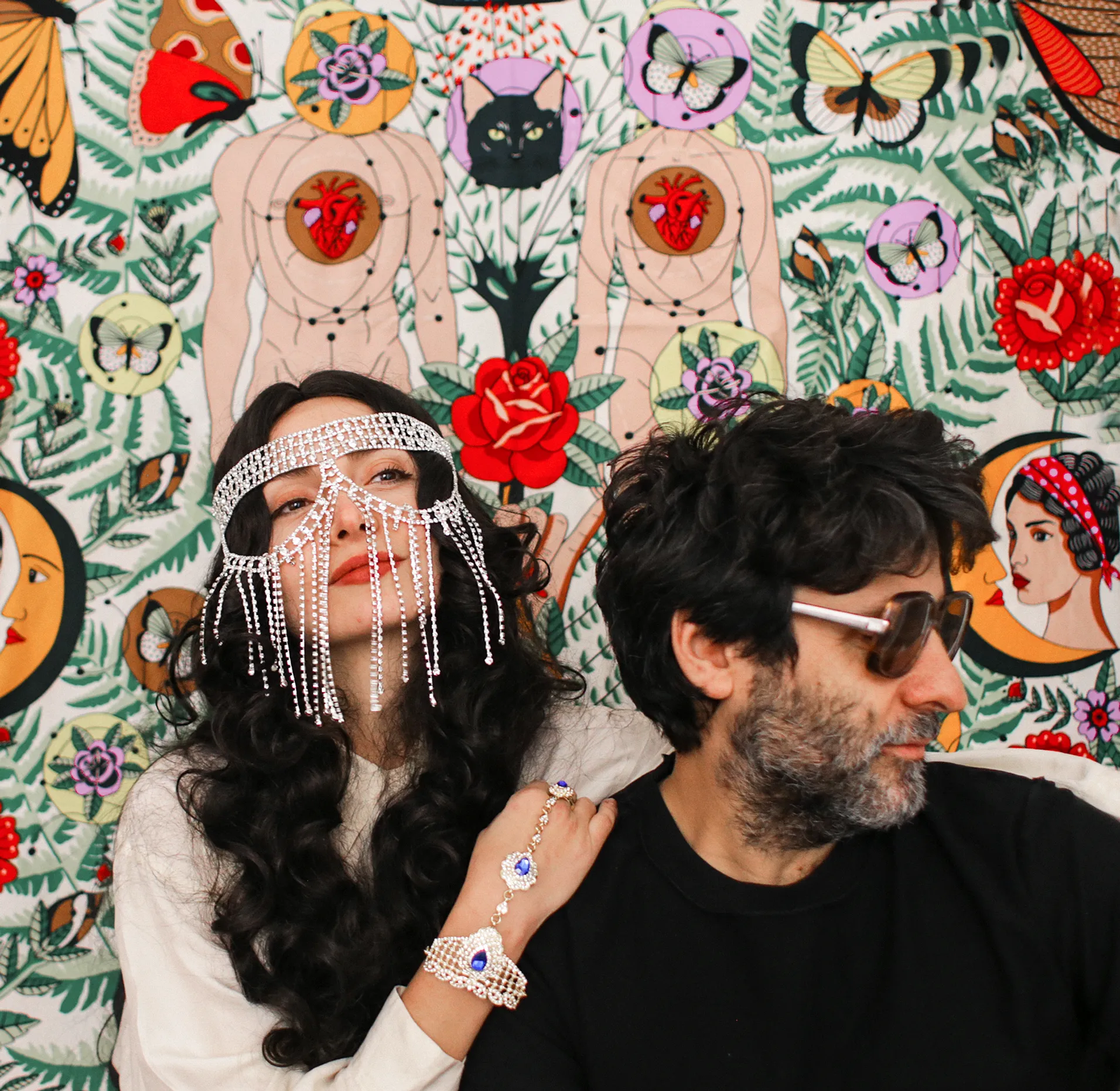In Context - Soap Kills: How Two Hamdans Spearheaded Arab Indie-Pop
This is the story of how Lebanese underground legends Soapkills emerged from postwar Lebanon, and shaped the Arab indie scene.

In the aftermath of the Lebanese civil war, as the people of the nation picked up the pieces to rebuild their homes, Beirut became fertile ground for the gestation of a rich underground music scene. Amongst the fastest growing underground legends is Lombrix, an indie band founded by Zeid Hamdan and his cousins, who went from performing in front of their friends and family to headlining at pubs and bars across Beirut. When the band began to work on their first official release, they recruited a young songstress named Yasmine Hamdan to provide her voice to their EP, a bold combination of rock and classical Arabic music.
Zeid Hamdan and Yasmine Hamdan (no familial relation) were both born in Beirut in 1976, and both of their upbringings were heavily affected by the civil war. Zeid spent most of his childhood in France, whereas Yasmine, fleeing the war with her family, moved between Gulf countries and Greece before eventually returning to Beirut after the war ended. Although the release of Lombrix’s EP put them squarely in the spotlight, the band decided to split up. This sudden fracture sparked the birth of something far greater - yearning for their war-torn home, Zeid and Yasmine took the opportunity to create Soapkills, a musical act that to this day continues to shape the Arabic underground scene and beyond.

During Lebanon’s postwar era, numerous artistic endeavours struggled to achieve genuine reconciliation. In stark contrast to the efforts of Prime Minister Rafic Hariri, who sought to bring together iconic Lebanese figures in order to manufacture a new vision of nationalism for the country, contemporary and alternative movements began to flourish of their own accord. Soapkills played a pivotal role in embodying the sound of these artistic movements, serving as an essential component of a wave of rebellious youngsters who couldn’t identify with national anthems, and found solace in breaking free from artistic and cultural stereotypes.

The band’s unusual name is based on a song Zeid wrote during their Lombrix era, which referred to the reconstruction of Beirut after the civil war. In a 2006 interview with Daily Star, Zeid revealed, “We thought that at the time, in the context of Beirut being ... you know, reborn, and all the war being wiped clean, we thought, wow, it's shiny and it's awful and it’s soap kills. We thought it would be a nice name for a band."
In the late 90s, the duo started recording music together. Zeid provided the vocals, guitar, bass, and synthesisers, while Yasmine contributed vocals and some guitar as well. The sound of Soapkills was characterised by the use of a Roland MC-303 Groovebox, which Zeid acquired to compensate for the absence of Lombrix’s other band members. The synthesisers became the backbone of Zeid’s compositions, dissolving his influences into a visionary sound that was only levelled up by Yasmine’s eerie and unique vocal performances.
Zeid was the mastermind behind the band’s musical direction, greatly influenced by acts like Massive Attack and Portishead which pioneered the trip-hop genre in the UK. However, Soapkills transcended the confines of mere 'trip-hop'. Their music was distinctive and revolutionary, with the x-factor lying in their deep appreciation for classical Arabic music and Eastern melodies. In fact, it's plausible to assert that their musical experience surpassed that of many global acts in both execution and experimentation. Their unique sound was like a fusion of Asmahan meeting Aphex Twin - an audacious combination of contrasting musical directions. Yet, Zeid's compositions, combined with Yasmine's emotive vocal performances, felt both natural and adventurous.
After taking over Lebanon’s music scene, Soapkills found their way into the Arab underground, performing in various cities across the Middle East in the late 90s. Soapkills’ debut full-length album, however, didn’t materialise until 2000. ‘Bater’ featured 10 tracks, most of which were sung in English, except for two tracks that were in Arabic and one in French.
Two years later, their next album, ‘Cheftak’, marked a bold evolution. Yasmine's interpretations of classical Arabic music interlaced with Zeid's innovative, minimal compositions, crafting a soundscape both familiar and strikingly contemporary. Their unique blend of downtempo, dub, trip-hop and oriental rhythms redefined independent music aesthetics through a distinctly Middle Eastern lens.
Soapkills would go on to release their last studio album, ‘Enta Fen’, in 2005, with new, original material as well as some remixes of their previous work. The duo delved deeper into weaving classical Arabic music within these dub and trip-hop textures. The tracks were all sung in Arabic; Yasmine’s vocal performances interpreted classical music from the likes of Asmahan and Abdelwahab, while Zeid’s production became more complex, embedding oriental sonic elements into minimal trip-hop compositions. It was melancholic and dreamy, and marked their most sophisticated work in terms of experimentation and sonic evolution.
Their sound diverged significantly from the typical Arabic music that dominated the scene at the time, as well as the European or American electronic sound that had taken the globe. Instead, it exuded authenticity, minimalism, and pulsated with innovation. The band cultivated a fanbase that extended well beyond the Middle East, particularly in Europe, given the duo's regular movement between France and Lebanon. Soapkills showcased their musical prowess in various European cities, with notable performances in Berlin and Paris.

Their sound was described by French media as “Oriental Trip-hop” and they gained critical acclaim from various established publications. Time has described them as part of "small but artistically significant rock scene" in Beirut. The band gradually acquired an emblematic status: their music appeared on several compilations and was featured in many movies, theatre and dance productions, as well as in modern art installations. Elia Suleiman's cult classic film ‘Divine Intervention’ (which won the Jury Prize at the Cannes Film Festival in 2002) featured two of the band's tracks.
After ‘Enta Fen’, however, Soapkills split up. Yasmine Hamdan and Zeid Hamdan both started working on their own projects. Zeid went on to form various bands and musical projects, most significantly The New Government with longtime collaborator Cherif Saad, a six-piece indie-pop-rock band. He also collaborated with different artists from the Middle East including Maryam Saleh, Hiba Mansouri and Muhammad Abdullah from ‘El Morabba3’. Most recently, Zeid formed Bedouin Burger with Lynn Adib, a cross-culture musical project blending electronic music with Bedouin and jazz music which has received critical acclaim for its innovative approach.

Meanwhile Yasmine crossed paths with the high-profile producer Mirwais. Together, they formed the duo Y.A.S., and in 2009, they released their album 'Arabology' in France. Subsequently, Yasmine embarked on her solo career, unveiling her debut solo album, titled 'Ya Nass.' She continued venturing into other mediums as well; making an appearance in the movie ‘Only Lovers Left Alive’, and composing the original soundtrack for the theatrical production 'Rituel pour une métamorphose' by Syrian playwright Saadallah Wannous, staged at the 'Comédie Française'. Her final full-length album, 'Al-Jamilat', released in 2017. She also released a remixed version of the album by various artists, including Acid Arab and Cubenx.
While the duo continues to work on their own careers, the impact of Soapkills continues to be felt, echoing through contemporary acts like Hello Psychaleppo, El-Morabba3 and Mashrou’ Leila, to name but a few. From the ruins of Lebanon’s civil war, Soapkills’ music emerged as a unifying force across the region, inspiring disenfranchised youth to form their own identities to this day.
Trending This Month
-
Dec 15, 2025
-
Dec 24, 2025






















